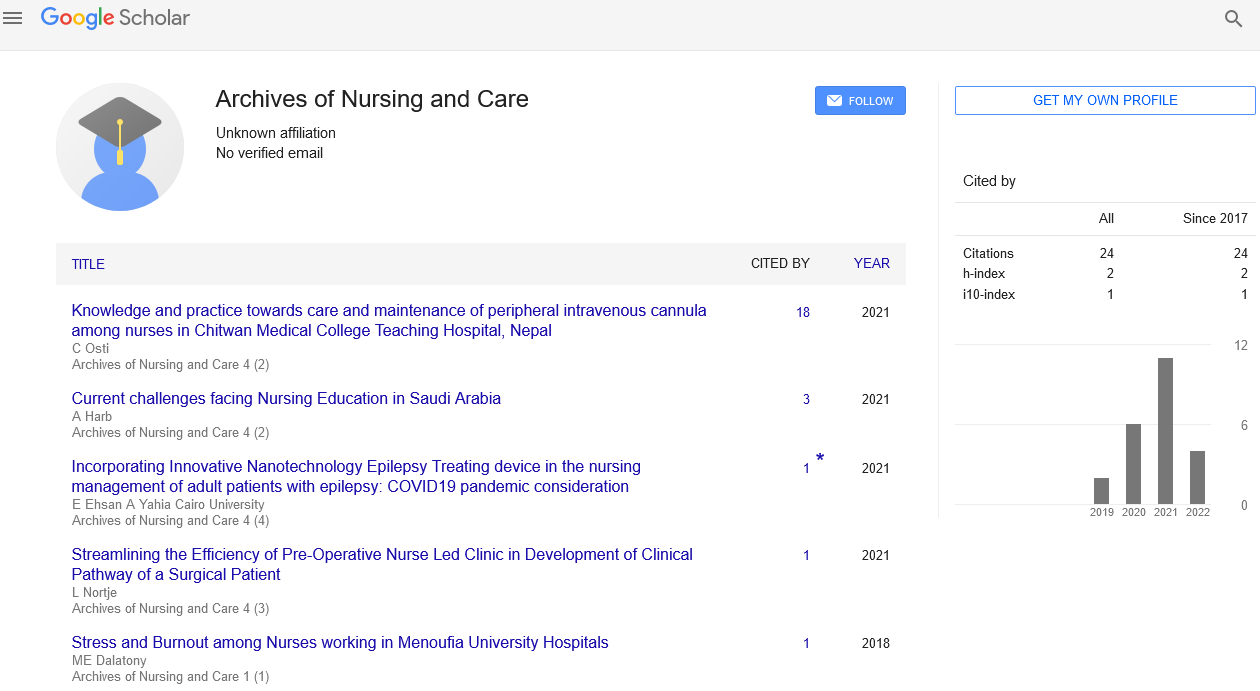Mini Review - Archives of Nursing and Care (2023) Volume 6, Issue 1
Public Health Systems
Harry Hellard*
Department of Health Research Methods, Canada
Department of Health Research Methods, Canada
E-mail: hellardharry@rediff.com
Received: 02-Jan-2023, Manuscript No. OANC-23-86218; Editor assigned: 04-Jan-2023, PreQC No. OANC-23-86218 (PQ); Reviewed: 18-Jan-2023, QC No. OANC-23- 86218; Revised: 23-Jan-2023, Manuscript No. OANC-23-86218 (R); Published: 30-Jan-2023; DOI: 10.37532/oanc.2023.6(1).007-009
Abstract
Background
There is pressure on public health systems around the world to provide healthcare in the face of rising financial resource constraints. Therefore, it's important to maximise the benefits of public healthcare spending on health. The purpose of this work is to establish and summarise the current evidence basis for system management-level methods to efficiency improvement.
Methods
Utilizing Rapid Evidence Assessment (REA) technique. A search technique was created, and when it was used (PUBMED, MEDLINE), it produced 5,377 different titles. 82 papers were included in the final review after 172 full-text articles were evaluated for relevance. A narrative synthesis was created after data describing the nation, study design, major findings, and efficiency improvement strategies were retrieved. Publications on developednation health systems were among them.
Results
Policy reviews, qualitative reviews, mixed-methods reviews, systematic reviews, literature reviews, retrospective analyses, scoping analyses, narrative papers, regression analyses, and opinion pieces were among the study designs that were identified. Despite the lack of broad frameworks for system-wide efficiency improvement found in the research, a number of particular centrally guided improvement initiatives were found. Dedicated central functions to drive system-wide efficiency improvement, managing efficiency in parallel with quality and value, and comprehensive stakeholder engagement were factors associated with success in present approaches.
Conclusions
The need for public health systems to become more effective is likely to keep growing. Reactive cost-cutting strategies and short-term initiatives that merely attempt to lower costs are unlikely to lead to a sustained increase in efficiency. Public health system management organisations can improve financial, health service and stakeholder results by offering dedicated central system-wide efficiency improvement support.
Keywords
Health services • Health systems • Population health • Public health
Introduction
Public health systems, which are those that provide publicly-funded healthcare, are under a lot of pressure to fulfil rising health care demand in situations with significant and growing financial resource constraints. Budget constraints, rising demand, an increase in the burden of diseases on infrastructure, technology improvements, shifting service models, rising consumer expectations, and changing access to services are just a few of the pressures that are affecting health systems around the world. The public health systems of many welldeveloped nations around the world are consequently characterised by a continual state of inefficiency in an environment of what appears to be perpetual improvement. This is made worse by a frequent tendency in which the pace of growth in health care expenditures is higher than the rate of funding growth, putting additional strain on public health systems that are already underfunded [1-5].
The role of government in defining health system budgets and service requirements is a common one among industrialised nations, even though the models through which public health systems are funded and constructed differ. System management organisations like Ministries of Health, Departments of Health, District Boards and Trusts are then in charge of centrally managing public health systems. Efficiency is viewed as an important component of value in healthcare and is described as maximising health outcomes attained for resources invested while also ensuring quality, safety, and experience outcomes. This definition fits with the recent focus on value-based healthcare.
Despite differences in system structures, wellestablished system performance indicators, and the existence of extensive literature on efficiency measurement in health contexts, ongoing and widespread obstacles to efficiency nevertheless remain. Achieving sustainable expenditure levels, lowering inefficiency, and cutting waste are some of these difficulties. Studies that concentrate on simultaneously tackling these difficulties at a systemic level are uncommon. A variety of instances where such support has been successfully managed are evident across the literature, despite the fact that there isn't a common consensus on a single standard of best practise for contemporary evidence for approaches to supporting efficiency improvement in public health systems [6-8].
In order to enable efficiency improvements across the health systems they oversee, management bodies of public health systems urgently need to solidify their grasp of modern, evidence-based techniques. A quick evidence synthesis was done to combine recent studies in order to fill the identified knowledge gap. The ensuing review inquiries were answered:
✓ How is public health systems conceptualised with regard to efficiency improvement? And
✓ How do organisations in charge of managing the public health system encourage efficiency growth throughout their own health systems? In order to set the stage for the article, question one was addressed first, with question two serving as the main subject of the review.
Methods
The review questions were addressed using Rapid Evidence Assessment (REA), a wellestablished method in public health policy and management research for examining wide and complicated issues. To search for and evaluate available evidence, this model adheres strictly to accepted systematic review procedures. Selected review processes are constrained to minimise the review period while maintaining the ability to evaluate the breadth of current knowledge. Instead of a shorter timescale, the key reason for choosing the REA technique for this study was the nature of the amount of literature. The varied character of the evidence base made the REA approach appropriate for this subject. The REA methodology was used in this study to limit the review by searching only two major relevant databases, extracting only the study findings specifically relevant to answering the review questions, and excluding grey literature. The study adhered to the CEBMa guideline for Rapid Evidence Assessments. The study process detailed below was guided by a review protocol that included eligibility criteria, exclusion criteria, a search strategy, and instructions for data extraction and synthesis. Due to the duration of the trial, the review protocol was not recorded [9-10].
Discussion
We found 82 papers that provided evidence of methods, elements, and aspects for managing efficiency improvement at a whole-system level, and we have combined this content to gather the most recent data. Efficiency improvement is hindered by a variety of typical public health system management strategies, such as continual restructuring, performance reporting delays, the establishment of reactive short-term targets, and the priority of cost reduction above service development. Barriers were also noted in the past design of health systems that relied on silos and service episodes. Barriers were also noted in the past design of health systems that relied on silos and service episodes. Despite the interdependence between financial performance and the outcomes of health services, both outcomes aren't typically addressed at the same time. It is not always possible to achieve sustained success for reform programmes throughout public health systems with capability, enthusiasm, and centrally-led support. It was stated that the advantages of technology for efficiency are sometimes exaggerated because creating and implementing such solutions is more expensive.
Its review's techniques vary in how they are situated from local to health system viewpoints, but this synthesis puts more emphasis on the system management entity's leadership of these approaches to help with efficiency growth. The current body of research has been found to be disjointed, and there is no proof of a best-practice standard to support efficiency growth in public health systems, according to this review. Instead, a large number of distinct elements were found to be related to public health system management approaches to increasing efficiency; taken as a whole, these aspects may help with the creation of a comprehensive support framework.
Conclusion
The need for efficiency in the provision of public health services keeps growing. For public health system management authorities, addressing the obstacles and enabling conditions mentioned in this paper represents an evidence-based strategy for integrating efficiency improvement. Combining these elements can help create a framework for enhancing public health system efficiency. Central health system management bodies can assist efficiency development while simultaneously enhancing stakeholder and service quality outcomes by dedicating systemwide support for it.
References
- Armitage N, Trethewie S. Paediatric palliative care-the role of the GP. Australian Family Physician. 43, 176-180 (2014).
- Wood F, Simpson S, Barnes E et al. Disease trajectories and ACT/RCPCH categories in paediatric palliative care. Palliative Medicine. 24, 796-806 (2010).
- O’Leary N, Flynn J, MacCallion A et al. Paediatric palliative care delivered by an adult palliative care service. Palliative Medicine. 20, 433-437 (2006).
- Jünger S, Vedder AE, Milde S et al. Paediatric palliative home care by general paediatricians: a multimethod study on perceived barriers and incentives. BMC palliative care. 9, 1-12 (2010).
- Vadeboncoeur CM, Splinter WM, Rattray M et al. A paediatric palliative care programme in development: trends in referral and location of death. Archives of Disease in Childhood, 95, 686-689 (2010).
- Happell B, Gaskin CJ. The attitudes of undergraduate nursing students towards mental health nursing: A systematic review. Journal of clinical nursing. 22, 148-158 (2013).
- Edwards D, Burnard P, Coyle D, et al. Stress and burnout in community mental health nursing: a review of the literature. Journal of psychiatric and mental health nursing. 7, 7-14 (2000).
- Ward L. Mental health nursing and stress: Maintaining balance. International journal of mental health nursing. 20, 77-85 (2011).
- Brown AM. Simulation in undergraduate mental health nursing education: A literature review. Clinical Simulation in Nursing. 11, 445-449 (2015).
- Barker P, Buchanan‐Barker P. Myth of mental health nursing and the challenge of recovery. International Journal of Mental Health Nursing. 20, 337-344 (2011).
Indexed at, Google Scholar, Crossref
Indexed at, Google Scholar, Crossref
Indexed at, Google Scholar, Crossref
Indexed at, Google Scholar, Crossref
Indexed at, Google Scholar, Crossref
Indexed at, Google Scholar, Crossref
Indexed at, Google Scholar, Crossref
Indexed at, Google Scholar, Crossref

